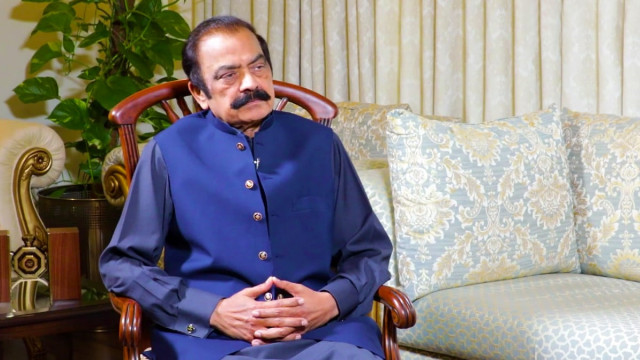Rana Sanaullah. PHOTO: FILE
ISLAMABAD:
Prime Minister’s Advisor on Political Affairs Rana Sanaullah on Friday ruled out any negotiations with the banned Tehreek-e-Labbaik Pakistan (TLP) party, saying the group was “created with the aim of reducing the vote bank of the PML-N”.
Earlier, the Ministry of Home Affairs had issued a notification declaring the TLP a banned organisation, placing it in the First Schedule of the Anti-Terrorism Act (ATA) 1997. A reference will now be sent to the Supreme Court through the Ministry of Justice.
Speaking on a private television channel’s show, Sanaullah, in response to a question regarding the future of the TLP as a political party and whether it was retained as an option to be used against rival political parties, acknowledged that the TLP had been used in the past for this purpose and went on to jokingly say that “it was created to steal votes from the PML-N vote bank.”
However, the adviser denied that the TLP’s current fate had anything to do with its previous use as a proxy group, saying “it was up to the federal cabinet to decide on possible dissolution plans.”
“I am not in a position to speak on behalf of the cabinet,” he said, expressing optimism about the decision to dissolve the party.
Asked if the government was willing to negotiate with the now-banned group if it provided assurances, citing the TLP ban in 2021 and its subsequent lifting, Sanaullah replied: “I think there can be no assurances after already violating the assurances given earlier.”
He stressed that “any party, whether political, religious or academic, involved in terrorist activities is likely to be banned under Article 11b of the Anti-Terrorism Act.”
The Punjab government on October 16 demanded a ban on the TLP. This request was approved by the federal cabinet on Thursday.
The Home Office notification states that the Federal Government considers the TLP to be involved in acts of terrorism and under section 11B(1A) of the ATA, it is declared prohibited and included in the First Schedule.
Legal experts note that the first schedule lists organizations prohibited under the ATA 1997.
Groups placed there face complete restrictions on their activities, including opening offices, holding gatherings, or attending any public events. Their funds and bank accounts are frozen and fundraising or financial assistance is prohibited.
Leaders and active members may face travel bans, while their media coverage and social media activities are also prohibited. The authorities can monitor these people by placing them in the fourth schedule to track their movements. Even rebranding under a new name is considered illegal, and continuing business under any name can lead to terrorism charges.
At least five people, including a police officer, three TLP employees and a bystander, were killed as law enforcement conducted a major pre-dawn operation in Muridke on October 13 to disperse what authorities described as “armed and violent crowds.”
The crackdown came amid a multi-day protest march by TLP supporters moving from Lahore to Islamabad in what the group called a pro-Palestinian demonstration.
In a high-level meeting chaired by Punjab Chief Minister Maryam Nawaz on October 16, it was agreed that TLP leaders and workers involved in the death of policemen and destruction of public property would be tried in Anti-Terrorism Courts (ATC).
Police claimed that during the Muridke crackdown, TLP protesters resorted to violence, as a result of which 48 police officers and Rangers personnel were injured, including 17 by gunshot wounds.




